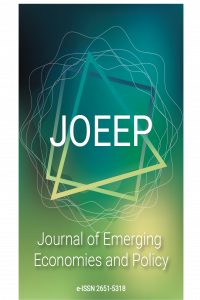Ekonomik Büyümenin Güney Afrika'da Çevresel Bozulma ve Enerji Tüketimine Etkisi: Bir Eşbütünleşme Analizi
Öz
Bu araştırma, 1971 ve 2015 yılları arasında Güney Afrika'da kentleşmenin rolünü ele alarak ekonomik büyümenin çevresel deregülasyon ve enerji kullanımı üzerindeki etki derecesini incelemek üzerine odaklanmaktadır. Bu incelemenin yapılabilmesi için Johansen ve Bounds eşbütünleşme testleri kullanılmıştır ve ortaya konan sonuçlara göre değişkenler arasında uzun dönemli bir ilişkinin varlığı ortaya koyulmuştur. Ayrıca çalışma sonuçlarına göre ARDL sonuçları göstermiştir ki (i) enerji kullanımı ve kentleşmenin çevresel deregülasyon üzerinde olumlu bir etki oluşturmakta; (ii) çevresel deregülasyon ekonomik büyümeyi olumlu yönde etkilemekte; (iii) ekonomik büyüme ve çevresel deregülasyon enerji kullanımı üzerinde olumlu bir etki oluşturmakta; ve son olarak (iv) kentleşme Güney Afrika'da enerji kullanımı üzerinde olumsuz bir etkiye sahip olmaktadır. Hem FMOLS analizi hem de DOLS analizi sonuçları da çalışmada uygulaması olan ARDL'nin bulgularını desteklemektedir. Ayrıca, Granger nedensellik testinin sonuçları da göstermiştir ki, bağımsız değişkenlerden uzun vadede ekonomik büyümeye bir nedensel ilişki bulunduğunu göstermektedir. Yine kısa vadede ekonomik büyümeden enerji kullanımı ve kentleşmeye doğru olan bir nedensellik ilişkisi bulunmuştur.
Anahtar Kelimeler
Kaynakça
- AbdulKareem, H. K., Adebayo, T. S., Kirikkaleli, D., Shah, M. I., & Abbas, S. (2022). CO2 behavior amidst the COVID-19 pandemic in the United Kingdom: The role of renewable and non-renewable energy development. Renewable Energy, 124 (10), 67-75
- Adebayo, T. S. (2020). Revisiting the EKC hypothesis in an emerging market: an application of ARDL-based bounds and wavelet coherence approaches. SN Applied Sciences, 2(12), 1-15.
- Adebayo, T. S., & Beton Kalmaz, D. (2020). Ongoing debate between foreign aid and economic growth in Nigeria: a wavelet analysis. Social Science Quarterly, 101(5), 2032-2051.
Impact of Economic Growth on Environmental Degradation and Energy Consumption in South Africa: A Cointegration Analysis
Öz
The present research focuses on the impact of economic growth on environmental degradation and energy usage by including the role of urbanization in South Africa between 1971 and 2015. By employing the Johansen and Bounds test cointegration approaches for this research, we revealed a long-run linkage among the variables. Also, according to the results of the study the ARDL exposes that (i) energy use and urbanization exert a positive effect on environmental degradation ; (ii) environmental degradation impacts economic growth positively; (iii) economic growth and environmental degradation exert a positive impact on energy usage; and finally (iv) urbanization exerts a negative influence on energy use in South Africa. The outcomes of both FMOLS and DOLS support the findings of the ARDL. In addition, the outcomes of the Granger causality test showed that a one-way causal relationship from all the regressors to economic growth in the long run. Besides, there is a unidirectional causal relationship running from economic growth to energy use and urbanization in the short run.
Anahtar Kelimeler
Kaynakça
- AbdulKareem, H. K., Adebayo, T. S., Kirikkaleli, D., Shah, M. I., & Abbas, S. (2022). CO2 behavior amidst the COVID-19 pandemic in the United Kingdom: The role of renewable and non-renewable energy development. Renewable Energy, 124 (10), 67-75
- Adebayo, T. S. (2020). Revisiting the EKC hypothesis in an emerging market: an application of ARDL-based bounds and wavelet coherence approaches. SN Applied Sciences, 2(12), 1-15.
- Adebayo, T. S., & Beton Kalmaz, D. (2020). Ongoing debate between foreign aid and economic growth in Nigeria: a wavelet analysis. Social Science Quarterly, 101(5), 2032-2051.
Ayrıntılar
| Birincil Dil | İngilizce |
|---|---|
| Konular | Ekonomi |
| Bölüm | Araştırma Makalesi |
| Yazarlar | |
| Yayımlanma Tarihi | 30 Haziran 2022 |
| Yayımlandığı Sayı | Yıl 2022 Cilt: 7 Sayı: 1 |
The sole purpose of JOEEP is to be a prestigious journal which contributes to scientific knowledge. In order to keep this purpose, JOEEP, adopts and follows the publication policies of world’s prestigious scientific journals. All original and qualified works which may contribute to the scientific knowledge, are evaluated through a rigorous editorial and peer review process. Hereby, JOEEP is a peer reviewed and scientific journal. It strictly depends on the scientific principles, rules and ethical framework that are required to this qualification.
JOEEP is published as two issues per year June and December and all publication policies and processes are conducted according to the international standards. JOEEP accepts and publishes the research articles in the fields of economics, political economy, fiscal economics, applied economics, business economics, labour economics and econometrics. JOEEP, without depending on any institution or organization, is a non-profit journal that has an International Editorial Board specialist on their fields. All “Publication Process” and “Writing Guidelines” are explained in the related title and it is expected from authors to Show a complete match to the rules. JOEEP is an open Access journal.

